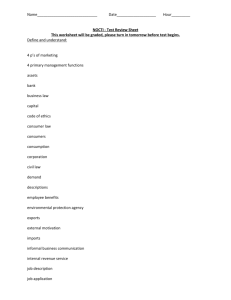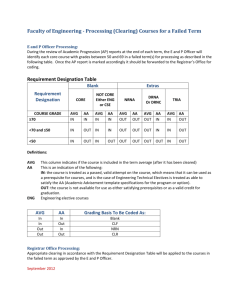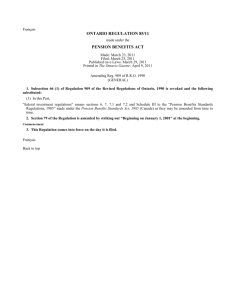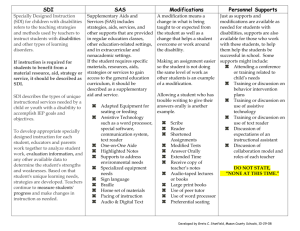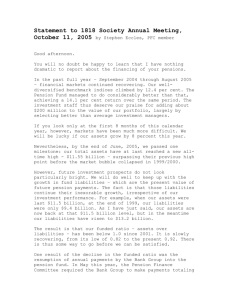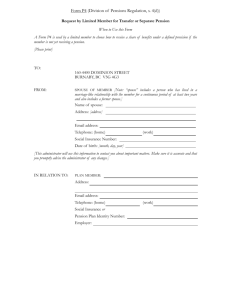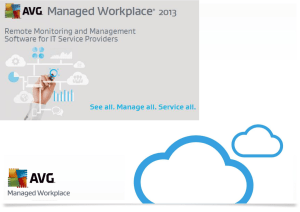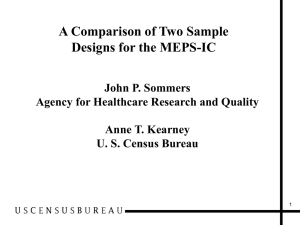Sustainable Development (SD) - Canadian Centre for Ethics in
advertisement
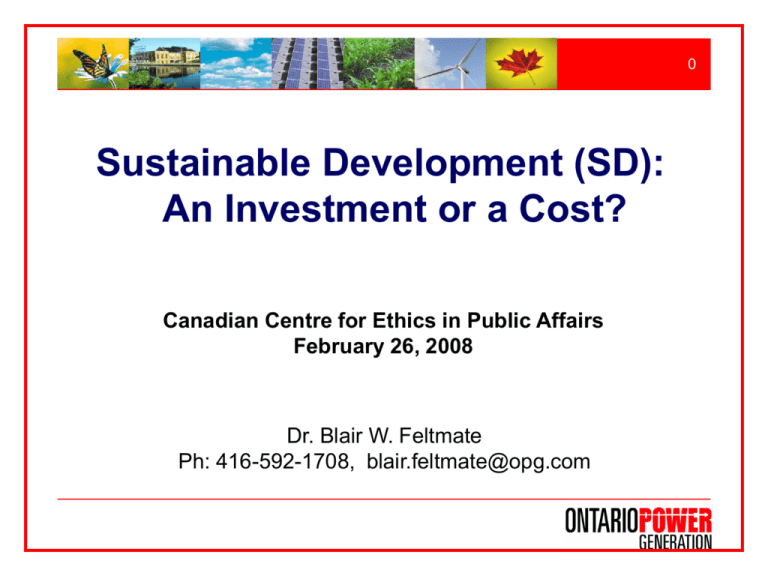
0 Sustainable Development (SD): An Investment or a Cost? Canadian Centre for Ethics in Public Affairs February 26, 2008 Dr. Blair W. Feltmate Ph: 416-592-1708, blair.feltmate@opg.com 1 Objectives • Define sustainable development (SD) • Identify which industry sectors are embracing SD • Profile the business case for SD • Profile emerging SD business drivers 2 Sustainable Development… “meeting the needs of the present without compromising the ability of future generations to meet their own needs” World Commission on Environment and Development, 1987 3 Society Environment - increase recycling efforts - produce less waste - support energy efficiency - reduce spills - lower SO2, NOx, greenhouse gas emissions - support biodiversity - manage nuclear waste - ISO 14001 Sustainable Development - support door-to-door community outreach, plant tours, etc. - support work/family life balance programs (e.g. flexible work hours) - recognize value of a diverse workforce Economy - support local procurement - support local hiring - support training and scholarship programs 4 Alcan Coca Cola Rio Tinto Ricoh Canfor Baxter Shell Canada Rezidor L’Oreal Suncor Royal Bank 5 Sustainable Development, Quality of Management and Shareholder Value Causal Factors/ Direct “Bottom Line” Impact • access to markets/new build • employee attraction/productivity • discount on borrowed capital/ lower insurance premiums • address customer demands • facilitate partnerships • increase efficiency • inclusion in “SD” Funds Correlational Factors/ “Quality of Management” • corporate governance • product innovation • financing options • manufacturing processes/ production line efficiency • skills upgrade • continuous improvement SHAREHOLDER VALUE Sustainable Development Index -- SDI Method • Quantitative • Comprehensive • Proprietary Measures • Practical • Meaningful • Cost Effective Analysis • Industry Specific • Rigorous Level 1 Metric Level 2 Metric Ranking 0 General Environment Economy Society SD Policy Goals and Targets Contact Persons Stakeholders Identified etc., etc. Waste Production Energy Consumption Energy Conservation Water Consumption Land Remediation etc., etc. Share Best Practices Local Procurement Local Hiring Contribution to Research Wage Based Economy etc., etc. Town Hall Meetings Odour Control Community Support Transferable Skills Development Recreational Support Aesthetic Values Heritage Sites etc., etc. 1 Avg. g = 3.5 2 3 4 5 ng = 4 Evaluating Performance Avg.e = 3.8 ne = 5 Avg. ec = 3.4 5 nec = 40 - 160 Performance Measures Avg. s = 3.7 site visits questionnaires interviews reviews of SD and Environmental Reports SDI = weighted average score SDI > 70% = SD Company = Superior Quality of Management ns = 7 ABC Co. = 72.3% 8 33 countries, 318 companies, 57 sectors $5 billion in investment vehicles 9 The sdEffect: Translates environmental, social and economic performance (eg. metals recycling, community outreach programs) for 6 mining companies into impact on share price, using: - Ratio Analysis - Discounted Cash Flow - Rules of Thumb Valuations - Economic Value Add (EVA) - Options Pricing "The report provides the first steps in using financial language to measure the impact of sustainable development on the bottom line. This report… lays the foundation in linking sustainable development to company performance and provides another tool for financial professionals to use in their on-going analysis.“ Donald Reed, President and CEO Franklin Templeton Investments Corp. 10 Emerging SD Drivers a. UK Turnbull Report -- as of 2000, required companies listed on London Stock Exchange to disclose all risk -- financial, environmental, social, ethical. Companies listed on the Toronto Stock Exchange (TSE) will be required to produce a “sustainable development” style report in the not-too-distant future (Barbara Stymiest, former President, TSE) b. Pension Legislation Changes -- as of 2000, UK required pension plans to disclose the degree to which they factor the “environmental, social and ethical” performance of companies into their investment decision-making -- since then… France, Germany, Belgium, Sweden, Australia adopted similar legislation. c. Canadian SRI Assets Under Management -- 2004 = $65 billion, 2006 = $504 billion : increase due primarily to SRI mandates by several major pension funds. 11 d. Canada Pension Plan -- created the position of “Manager, Responsible Investing” -- CPP manages > $100 billion. e. MBA Programs -- most MBA programs now feature “Corporate SD” courses. Ivey School of Business, University of Western Ontario, all students are required to take course in corporate SD. f. Global Reporting Initiative (GRI) and ISO 26000 Guidelines -International standards have been developed to guide corporate SD reporting. Standards are now in place for industry sectors. [2,000 - 2,500 companies produce SD Reports] g. Cost of Carbon -- CO2 at $15 - 30 per tonne h. Al Gore -- An Inconvenient Truth : James Lovelock -- Gaia i. World Population Growth -- another 2.25 billion people by 2025 2030 12 Conclusions • An “environmental” focus is out-of-date -sustainable development is the new business imperative, regardless of industry sector. • SD is a long-term trend, not a fad. • SD, properly applied, is a revenue generator -not a “cost” -- that correlates with quality of management.



